 Iran’s Attack on Israel
Iran’s Attack on Israel
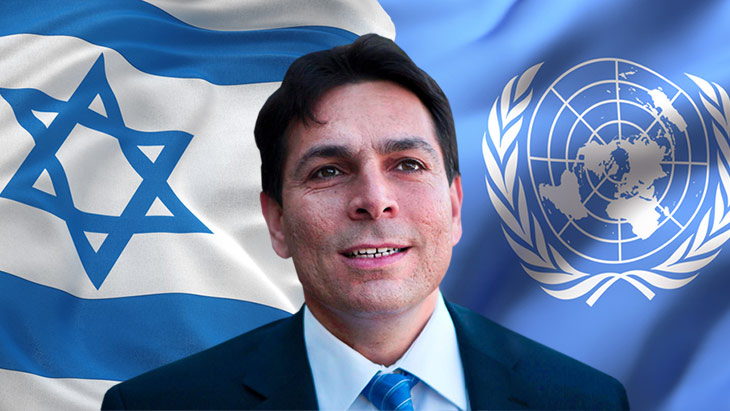

14 min read
Exclusive conversation with Israel’s outgoing ambassador on everything from peace to the Torah.
Danny Danon is back in Israel, having completed a 5-year stint as Israel's Ambassador to the United Nations – one of the toughest diplomatic positions in the world. His tenure corresponded with the global rise of anti-Semitism and BDS, and was punctuated this month with the historic peace agreement between Israel and United Arab Emirates.
Danon – a gritty, focused and eminently straightforward tactician – got his start in the early 1990s as a Jewish Agency emissary in Miami. He then became global head of Betar, and later global head of Likud. In 2009, Danon was elected to Israeli Knesset, successively serving as Deputy Speaker, Deputy Minister of Defense, Minister of Science and Technology, and in 2015, Israel's Ambassador to the U.N.
Aish.com caught up with Danon for a behind-the-scenes look at the past five years of his diplomatic rollercoaster ride.
Aish.com: Israel’s new peace deal with the UAE is a seismic shift – opening up Israeli technology and export to the second-largest economy in the Middle East. The UAE agreement also weakens the BDS movement as Arab countries move away from boycott. Most of all, the agreement puts to rest the myth that peace in the Middle East revolves around first solving the Palestinian issue.
How do you envision Middle East dynamics unfolding over the next few years, and how does the UAE deal impact the Palestinian stalemate?
Danon: Unfortunately, I don't see a Palestinian leadership willing to negotiate directly with Israel. So today we have to speak about a new paradigm. In the past, in order to advance Israel regionally, the paradigm was to first solve the Palestinian conflict. Today it's the exact opposite. We are working with the Arab world and they will help us negotiate with the Palestinians. Today we have full diplomatic relations with Jordan, Egypt, the UAE – and other countries may follow soon. Then maybe we can sit down together and try to resolve the Palestinian conflict.
Aish.com: The wall of U.N. headquarters is engraved with the visionary words of Isaiah – "They shall beat their swords into plowshares" – hearkening to the U.N.'s original, noble mandate to promote peace and justice. Yet the entire apparatus has been hijacked by corrupt Third World forces – a voting bloc that results in Israel being condemned by more U.N. resolutions than any other nation in the world. Former Israeli Ambassador to the U.N. Abba Eban once said that if the U.N. introduced a resolution declaring that “the earth was flat and Israel flattened it,” it would pass by an overwhelming majority.
Over the past five years, how did you manage to shift sentiment toward Israel in such a hostile environment?
Danon: When the U.N. was established after the Second World War, it had a clear agenda to prevent war and to promote dialogue. Unfortunately, the U.N. today is not the U.N. that was established 75 years ago. Today you see anti-Israel resolutions in a proportion that doesn't make sense. Twenty-two resolutions every year condemn Israel, and only one resolution condemns Iran. This is absurd.
By focusing on three pillars – Judaism, Israel, and innovation – we changed the reality at the U.N. The best example is when I ran for chairmanship of the U.N. legal committee. It was a secret ballot, and I received the support of 109 member states. Only 44 voted against me. I became the first Israeli ever to chair a permanent U.N. committee. This is proof that change is possible.
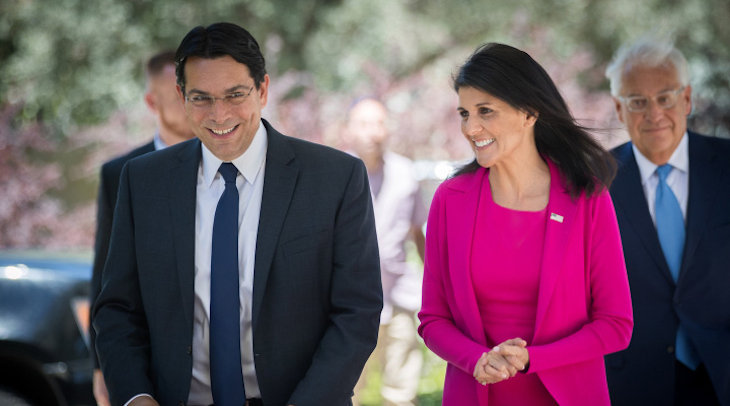 Danny Danon with then-U.S. Ambassador the U.N. Nikky Haley. On the right: U.S. Ambassador to Israel David Friedman.
Danny Danon with then-U.S. Ambassador the U.N. Nikky Haley. On the right: U.S. Ambassador to Israel David Friedman.
Aish.com: At the U.N., the United States and Israel vote in concert 88 percent of the time; by contrast, other Mideast "allies" like Egypt and Saudi Arabia vote with the U.S. less than 10 percent of the time. In fact, U.S. State Department figures show that for decades, Israel votes with the U.S. more than Great Britain, France, Canada or any other country in the world.
Yet Israel has always walked a fine line in asserting its own national priorities. Ben Gurion defied American pressure by declaring statehood; Levi Eshkol boldly defied the U.S. with the 1967 preemptive strike; and Menachem Begin was condemned by the U.S. for annexing the Golan Heights and destroying the Iraqi nuclear reactor.
In the past, you’ve spoken against appeasing the United States, saying that “U.S. pressure on Israel hurts Israel and does nothing to advance peace.” This was a theme of your 2012 book, Israel: The Will to Prevail. Having spent five years in such a sensitive diplomatic post, working closely with three American ambassadors to the U.N., has your view of this matter evolved?
Danon: Whenever Israel makes decisions by itself without asking permission from friends and allies, in the long run we gain the respect of the world that these were the right decisions. Aside from the examples you mention, Prime Minister Olmert, whose political positions I don't support, deserves credit for his decision in 2007 to attack the Syrian nuclear reactor. President George W. Bush writes in his memoir about the day he told Olmert not to attack – yet after Israel demolished the reactor, Bush’s respect for Israel increased.
So you don't always have to appease your allies. We have to do what's good for Israel and the Jewish people in the long run.
Aish.com: In 2010, the U.N.’s cultural arm, UNESCO, voted to declare Rachel's Tomb a mosque, and decreed that preserving it as a Jewish site is a violation of international law. Then in 2016, the White House helped orchestrate the passage of Resolution 2334, saying that Jewish presence in the Old City of Jerusalem – including the Western Wall – flagrantly violates international law.
In response to such hateful denials of the truth, you donned a kippah and delivered a speech at the U.N. – which subsequently went viral – speaking about the land of Israel as the cradle of Jewish identity. You read in Hebrew from the Bible, then held it aloft and declared: "This is our deed to the land."
Also, during your tenure as Israeli Ambassador, you brought over 100 U.N. Ambassadors on trips to Poland and Israel – first showing them gas chambers in Auschwitz, then Hamas terror tunnels in Israel’s south and Hezbollah terror tunnels in the north (dug under the nose of U.N. peacekeepers).
How does Israel’s religious and historic identity impact your approach to global diplomacy, and how does that all affect Israeli security?
Danon: From a Jewish perspective, I led a new wave at the U.N. First, I am a very proud Jew. So I brought Judaism into the halls of the U.N. I brought kosher food to the cafeterias, got Yom Kippur to be recognized, and educated other ambassadors about Jewish holidays, traditions and culture.
Not only did I bring Israel to the U.N., but I brought the U.N. to Israel. Together with these 100 U.N. ambassadors, I traveled the land and walked through the Old City of Jerusalem. In seeing these Jewish historic sites, I asked them, “How can you now say that we have no connection to the land, as claimed by U.N. resolutions and the Security Council?”
I gained the respect of many U.N. ambassadors, including Muslim ambassadors, because I proved our rights to the land. I spoke from my heart and read the biblical account of God’s promise to Abraham. Whether Christian, Muslim or Jew, it is the same scripture, so you can't argue with that. This is our deed to the land. If you have something else, prove it.
Aish.com: Over the past five years, Israel’s relationship with the U.S. has had its ups and downs. Take us behind the scenes.
Danon: During the vote on Resolution 2334 that condemned our presence in Jerusalem, I felt alone with so many of our friends voting against us. On the other hand, I had the support of millions of Jews, Christians and even Muslims who believe in our rights to the land. And I knew that we will overcome this shameful resolution.
Look at what has happened since then – the U.S. Embassy has been moved to Jerusalem, the U.S. recognized Israeli sovereignty on the Golan Heights, and we are now cementing our presence in the region with the UAE peace treaty. So I think we should be optimistic and continue to speak about our rights to the land.
Some people in Israel think that we can appease others by apologizing all day long. We should not apologize for our birthright, our connection to the land. We need to proudly speak out more.
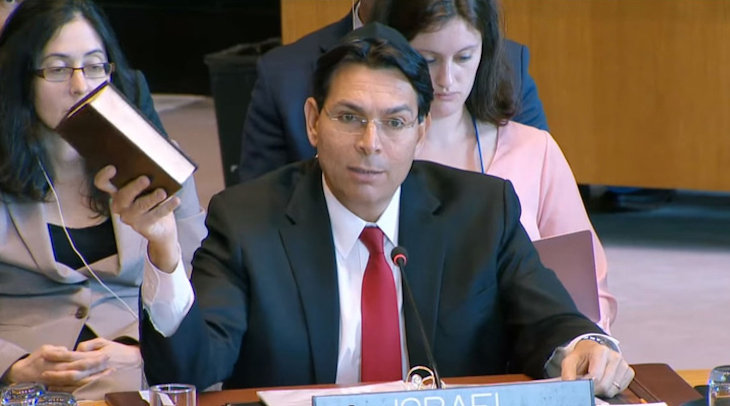 Danny Danon at the U.N.: "This is our deed to the land."
Danny Danon at the U.N.: "This is our deed to the land."
Aish.com: How does Israel as the “start-up nation” aid in the cause of international diplomacy?
Danon: When I brought the ambassadors to Israel, I showed them not only the security challenges, but also the opportunities – the innovation, technology, and start-up companies. We Israelis sometimes make the mistake of focusing too much on security. Most people around the world are lucky and don't have to constantly deal with terrorism. People care more about sustainable development – water, food, health. So we have to change the narrative and show the world our capabilities on those soft issues. We can do a real tikkun olam by sending our technology and innovation to the entire world, to build bridges and help them with our know-how.
Aish.com: You brought these ambassador delegations to the rooftop of Aish HaTorah, overlooking the Temple Mount, Mount of Olives, and Western Wall. How would you describe the experience?
Danon: One of the highlights of the trip is coming to Jerusalem and feeling holiness in the Old City. When you stand on the Aish rooftop, one of the most beautiful spots in Israel, you feel the presence of God. You cannot ignore it.
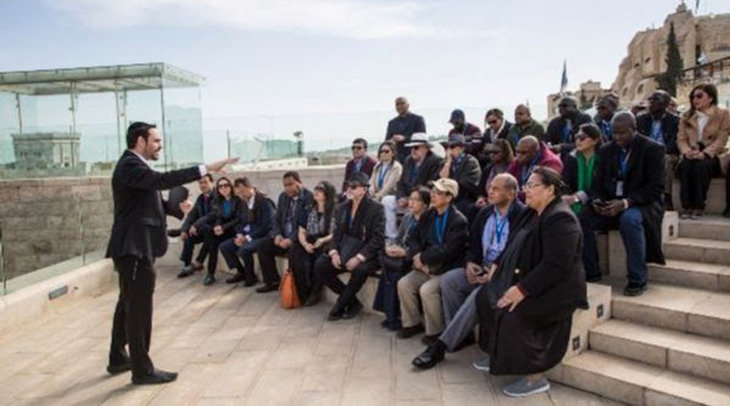 Aish Rabbi Etiel Goldwicht speaks to a delegation of U.N. on the roof of Aish HaTorah.
Aish Rabbi Etiel Goldwicht speaks to a delegation of U.N. on the roof of Aish HaTorah.
Aish.com: Since the founding of the State of Israel, hundreds of U.N. resolutions have dealt specifically with Palestinian refugees. Your father left Egypt in 1950, among the 850,000 Jewish refugees from Arab countries following the establishment of the State – yet no U.N. resolution has ever referenced the plight of these displaced Jews. What progress is being made at the U.N. to recognize these forgotten Jewish refugees?
Danon: There are more Jewish refugees from Arab countries than there are Muslim refugees who left Palestine. My father left property in Alexandria, Egypt, and many people left everything they had behind. We are not seeking compensation. Rather we demand recognition that this will be written in the history books. So I drafted a resolution about this. Unfortunately, with Covid-19 everything got shut down at the U.N. But I'm certain that Israel will continue to push forward the resolution I drafted.
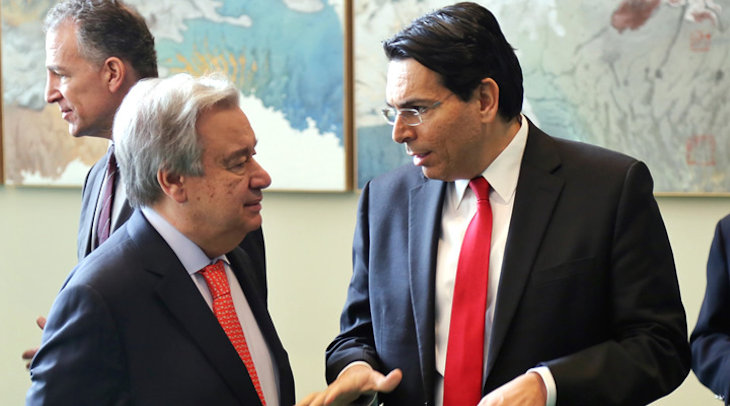 Danny Danon with U.N. Secretary-General António Guterres.
Danny Danon with U.N. Secretary-General António Guterres.
Aish.com: Throughout your career, you’ve staked much political capital on Israeli policy in Gaza – opposing Ariel Sharon’s 2005 Gaza Disengagement, and in 2014 you were fired as Deputy Minister of Defense for criticizing the handling of Operation Protective Edge. Yet the problem remains unsolved – last year, your hometown of Moshav Mishmeret was hit by a rocket from Gaza, and arson-balloons are used daily in cross-border attacks. How would you solve the Gaza situation – both from the security and humanitarian standpoints?
Danon: I distinguish between the people of Gaza and the Hamas regime that rules Gaza. I feel bad for the people in Gaza, and I pray for the day that there will be a real Palestinian leadership we can negotiate with.
Ironically, at the U.N. I occasionally found myself fighting for the rights of Gazans – against the Palestinian Authority representatives. For example, there was a crisis of electricity in Gaza and some countries wanted to transfer funds to assist, so I helped coordinate this with the U.N. professionals. But the Palestinian representatives of President Abbas in Ramallah tried to block the initiative, hoping to deny the people of Gaza more electricity. That’s who we are dealing with.
Aish.com: Iranian leaders have threatened to “wipe the Israeli cancer off the map.” The UAE deal gives Israel a better geographic launch-point for any future attack against Iranian nuclear facilities. On the other hand, the Europeans have now allowed the lifting of an arms embargo to Iran. In today’s complex geopolitical environment, what should be Israel’s strategy for stopping Iran from moving full-force to develop nuclear weapons?
Danon: We will do whatever is necessary to stop Iran from obtaining nuclear weapons, and this is not only Israel. U.S. leaders speak forcefully about this, and when I visited the UAE three years ago, most of the discussions focused on the threat from Iran. So it is a regional issue, and we are very determined to stop Iran.
Aish.com: There is talk about Iranian “sleeper cells” operating across the globe. How concerned should the United States be about the Iranian nuclear threat?
Danon: Today with globalization, if you have a nuclear bomb, you can pack it in a suitcase, fly to South America, and within two days it will be in California. So yes, I think everyone should be worried. No one wants the leaders of Iran to have nuclear weapons, because we saw what they did in the past. Look at the attempted attacks on multiple Israeli embassies, and the deadly bombing that destroyed the Jewish Center in Buenos Aires, Argentina – the explosives and terrorists were all from Iran. So, God forbid, if they get nuclear weapons, just imagine what they might do.
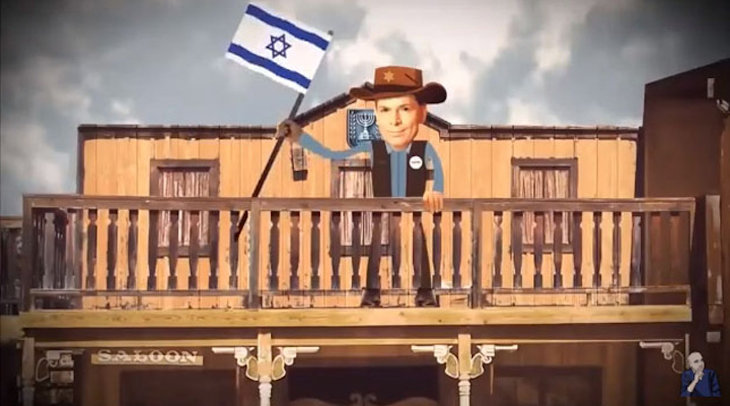 Danon in an Israeli campaign video as the maverick "new sheriff in town."
Danon in an Israeli campaign video as the maverick "new sheriff in town."
Aish.com: In both 2007 and 2014, you challenged Bibi Netanyahu for Likud party leadership. Now that you’re back in Israel, how are you positioning yourself in politics?
Danon: I’ve returned to Israel with a lot of passion, knowledge, experience and connections. I am eager to continue to serve my people as a public servant. I support the prime minister, and I stand behind him. But we all know that he will not stay forever, and when the day will come, I definitely see the option of running for an even higher position that I had as a government minister. In the same way I was able to win in the U.N. halls, God willing, I will be able to win also in the political halls here in Israel.
Aish.com: When you were appointed to the role of UN Ambassador in 2015, Haaretz listed "six reasons to worry” – saying that "Danon's appointment throws Israel off the diplomatic cliff." What do you regard as your biggest achievement to silence the critics?
Danon: Because I come from the right side of the political spectrum and my ideology is clear, they doubted that I will succeed. I don't expect them to apologize, and actually I should thank them. Because of the low expectations, it was very easy to prove them wrong. I showed that you can stay loyal to your values – supporting our rights to Israel and being a proud Jew – and still gain the support and respect of the nations. That is the lesson we taught the many skeptics.
Aish.com: What do you regard as a particular challenge you encountered at the U.N., where in retrospect you could have handled the situation differently?
Danon: One issue I regret is that we didn't run for a seat on the Security Council. When a seat became available in 2018, I lobbied for that and tried to convince my colleagues in Jerusalem to give me the support to run for the position. At the end of the day, they decided that we don't have the budget and the manpower. Looking back, we should have pushed more for that. It's about time that Israel, a full member state of the U.N., deserves a seat on the Security Council.
